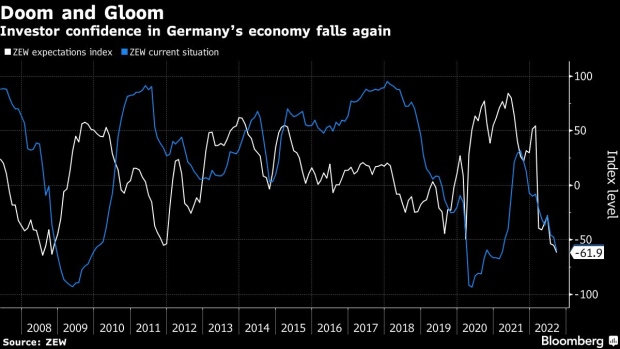Sep 13, 2022
German Investor Outlook Sours as Winter Energy Squeeze Nears
, Bloomberg News

(Bloomberg) -- Investor confidence in Germany’s economy, already beneath its pandemic low, deteriorated further as fears grow that a winter energy squeeze will trigger a recession.
The ZEW institute’s gauge of expectations fell to -61.9 in September from -55.3 the previous month, worse than economists’ estimates. An index of current conditions also plunged.
“The prospect of energy shortages in winter has made expectations even more negative for large parts of the German industry,” ZEW President Achim Wambach said Tuesday in a statement. “In addition, growth in China is assessed less favorably. The latest statistical figures already show a decline in incoming orders, production, and exports.”
Households and businesses in Europe’s largest economy are bracing for the possibility of energy rationing after Russia throttled shipments to the region. The latest German business surveys signal activity has already entered a contraction, after eking out growth in the second quarter.
While the government is allowing gas companies to pass on some higher costs to customers, it’s so far avoided direct intervention, such as capping prices. Instead, the ruling coalition recently introduced a third aid package designed to help citizens deal with the cost-of-living crisis.
On Monday, the Ifo Institute predicted that German inflation will only peak in the first quarter of 2023 as surging energy costs trickle down to consumers, weighing on purchasing power and tipping the country into a recession during the winter.
©2022 Bloomberg L.P.






